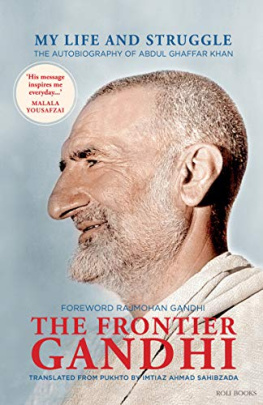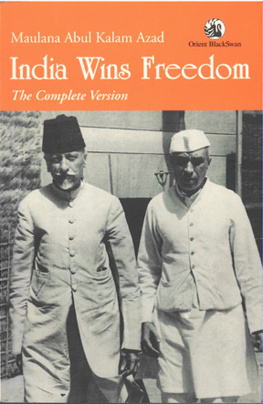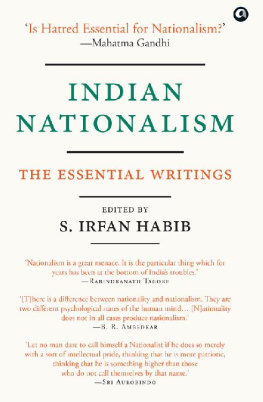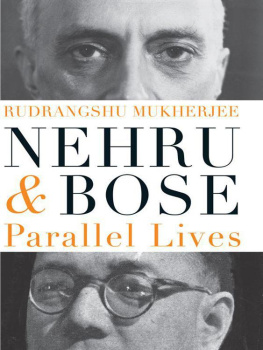I hope and trust that god will help us in the sacred mission and people will recognize that the essence of love, truth and non-violence is the hallmark of every good, free and prosperous society KHAN ABDUL GHAFFAR KHAN
K han Abdul Ghaffar Khan was known as the Frontier Gandhi. His unflinching advocacy of non-violence made him a legend in his lifetime. A Pathan from the North West Frontier Province, a place where feuds were routinely settled by bloodshed, the Frontier Gandhis commitment to non-violence was all the more extraordinary and he and his followers, the Khudai Khidmatgars, came to be widely admired for their convictions. He joined the Indian National Congress and played an active role in the anti-colonial struggle. Khan Abdul Ghaffar Khan fought the idea of partition relentlessly, refusing to make common cause with the Muslim Leagues demand for a Muslim homeland, but events overtook him and the NWFP became part of the new nation of Pakistan. After 1947, Ghaffar Khan continued to champion non-violence. He was imprisoned several times for his criticisms of the Pakistani state. In all he spent fifty-two years of his ninety-eight in jail. He died in 1988 and is buried in Jalalabad, Afghanistan.
Khan Abdul Ghaffar Khan spoke out passionately against communalism, against the formation of identities according to creed. His unflinching commitment to non-violence and to the vital importance of a secular, pluralist outlook give his words an authority that resonates even today.
Khan Abdul Ghaffar Khan (18901988) was born into a leading family of Khans in the North West Frontier Province. Khans passion for equality, secularism and non-violence led him to join the anti-colonial struggle. He opposed the partition of the country, but continued his fight for freedom and justice after 1947 in the new state of Pakistan. He was nominated for the Nobel Peace Prize in 1985 and awarded the Bharat Ratna by the Indian governmentthe first non-Indian citizen to receive this award.
Cover illustration by Nitesh Mohanty
To celebrate the sixtieth anniversary of the Indian Republic, the Words of Freedom series showcases the landmark speeches and writings of fourteen visionary leaders whose thought animated the Indian struggle for Independence and whose revolutionary ideas and actions forged the Republic of India as we know it today.
Books in the series
B.R. Ambedkar
Aruna Asaf Ali
Maulana Abul Kalam Azad
Subhas Chandra Bose
Mohandas Karamchand Gandhi
Khan Abdul Ghaffar Khan
Sarojini Naidu
Jawaharlal Nehru
Vallabhbhai Patel
Rajendra Prasad
C. Rajagopalachari
Periyar E.V. Ramasami
Bhagat Singh
Rabindranath Tagore
WORDS
OF
FREEDOM
IDEAS OF A NATION
KHAN ABDUL GHAFFAR KHAN

PENGUIN BOOKS
Published by the Penguin Group
Penguin Books India Pvt. Ltd, 11 Community Centre, Panchsheel Park, New Delhi 110 017, India
Penguin Group (USA) Inc., 375 Hudson Street, New York, New York 10014, USA
Penguin Group (Canada), 90 Eglinton Avenue East, Suite 700, Toronto, Ontario M4P 2Y3, Canada (a division of Pearson Penguin Canada Inc.)
Penguin Books Ltd, 80 Strand, London WC2R 0RL, England
Penguin Ireland, 25 St Stephens Green, Dublin 2, Ireland (a division of Penguin Books Ltd)
Penguin Group (Australia), 250 Camberwell Road, Camberwell, Victoria 3124, Australia (a division of Pearson Australia Group Pty Ltd)
Penguin Group (NZ), 67 Apollo Drive, Rosedale, North Shore 0632, New Zealand (a division of Pearson New Zealand Ltd)
Penguin Group (South Africa) (Pty) Ltd, 24 Sturdee Avenue, Rosebank, Johannesburg 2196, South Africa
Penguin Books Ltd, Registered Offices: 80 Strand, London WC2R 0RL, England
First published by Penguin Books India 2010
Anthology copyright Penguin Books India 2010
We are grateful to the Gandhi Peace Foundation for permission to use quotations from Abdul Ghaffar Khan: Faith is a Battle by D.G. Tendulkar (1967), published for the Gandhi Peace Foundation by Popular Prakashan, Mumbai.
All rights reserved
While every effort has been made to trace copyright holders and obtain permission, this has not been possible in all cases; any omissions brought to our attention will be remedied in future editions.
ISBN: 978-01-4306-891-4
This digital edition published in 2011.
e-ISBN : 978-81-8475-194-9
This e-book is sold subject to the condition that it shall not, by way of trade or otherwise, be lent, resold, hired out, or otherwise circulated without the publishers prior written consent in any form of binding or cover other than that in which it is published and without a similar condition including this condition being imposed on the subsequent purchaser and without limiting the rights under copyright reserved above, no part of this publication may be reproduced, stored in or introduced into a retrieval system, or transmitted in any form or by any means (electronic, mechanical, photocopying, recording or otherwise), without the prior written permission of both the copyright owner and the above-mentioned publisher of this e-book.
Contents

Introduction
Khan Abdul Ghaffar Khans unflinching advocacy of non-violence amongst the fierce Pathan tribesmen of the North-West Frontier Province (NWFP) made him a legend in his lifetime. Ghaffar Khan, also called Badshah Khan and sometimes the Frontier Gandhi, was born into a leading family of Khans at Charsadda near Peshawar in 1890. Throughout his life he turned his back firmly not only on the privileges of his feudal background but on the established Pathan code of resolving issues through blood feuds and wars. From an early age he understood the connection between backwardness and belligerence and the movement he founded, the Khudai Khidmatgars, was an organized rural force that eschewed violence and opposed all forms of oppression. He joined the Indian National Congress in their fight against colonial rule and was closely associated with Mahatma Gandhi, Jawaharlal Nehru, Rajendra Prasad and Maulana Azad. He fought the idea of partition relentlessly, refusing to make common cause with the Muslim Leagues demand for a Muslim nation and led a boycott of the referendum held in NWFP on the subject in 1946 on the grounds that it was communalizing the issue. When the division of the country and the allocation of NWFP to Pakistan became inevitable, he famously wrote to Gandhinot with bitterness, but in absolute desolation: You have thrown us to the wolves.
After 1947, Ghaffar Khan continued his fight for liberty and justice. He was imprisoned several times for his outspoken criticism of the Pakistan regime and his opposition to the measures against the people of what was then East Pakistan. In all he spent fifty-two years of his ninety-eight in jail. He died in 1988 but his unflinching commitment to non-violence and the importance of a secular tolerant outlook give his words a resonance and authority even today.
I hope and trust that God will help us in the sacred mission and people will recognize that the essence of love, truth and non-violence is the hallmark of every good, free and prosperous society.
THE PATHANS
1942
 WHILE THE PATHANS ARE INTENSELY FREEDOM-LOVING AND RESENT ANY KIND OF SUBJUGATION, MOST OF THEM ARE BEGINNING TO UNDERSTAND THAT THEIR FREEDOM CAN WELL HARMONIZE WITH THE CONCEPTION OF INDIAN FREEDOM, AND THAT IS WHY THEY HAVE JOINED HANDS WITH THE REST OF THEIR COUNTRYMEN IN COMMON STRUGGLE, INSTEAD OF FAVOURING THE SCHEME OF BREAKING UP INDIA INTO MANY STATES. They have come to realize that the division of India will result in an all-round weakness in the modern world, where no part of it will have sufficient resources and strength to preserve its own freedom. The days of isolation are no more. A new conception of international collaboration and co-operation is seeking to be born. The Pathans hate compulsion and dictation of any type, but of their own free will, they are prepared to work in unity and co-operation with others in this country as well as their brethren of the tribal territories, who have so long been kept aloof from us and forced to lead a life unworthy of a people. But while I share these sentiments with my people, I cannot for a moment deny them the right of self-determination. There can be no forced conversion to a doctrine, and at the proper time each unit will automatically exercise its own discretion to decide any future. Yet the desirability of India as a whole developing close relations and endeavouring to build up a powerful federation of Asiatic peoples to resist aggression from outside, cannot be ruled out and will act as the chief factor to compel the forces of separatism to think differently and establish close contacts with those they are opposing today. The Asiatic countries will not be aggressive or hostile to others in the world and will strive to develop friendly relations with them. But on no account will they permit the present form of things to continue and labour under adverse conditions. It is encouraging to find that there are many who envisage such a bloc of peace and freedom in the East and look to it for ushering in a new era. The Frontier Province is so situated that, as in the past, it will inevitably become the pivot and centre of all these great changes and alliances, and will begin to play an important role not only in a free India, but in free Asia.
WHILE THE PATHANS ARE INTENSELY FREEDOM-LOVING AND RESENT ANY KIND OF SUBJUGATION, MOST OF THEM ARE BEGINNING TO UNDERSTAND THAT THEIR FREEDOM CAN WELL HARMONIZE WITH THE CONCEPTION OF INDIAN FREEDOM, AND THAT IS WHY THEY HAVE JOINED HANDS WITH THE REST OF THEIR COUNTRYMEN IN COMMON STRUGGLE, INSTEAD OF FAVOURING THE SCHEME OF BREAKING UP INDIA INTO MANY STATES. They have come to realize that the division of India will result in an all-round weakness in the modern world, where no part of it will have sufficient resources and strength to preserve its own freedom. The days of isolation are no more. A new conception of international collaboration and co-operation is seeking to be born. The Pathans hate compulsion and dictation of any type, but of their own free will, they are prepared to work in unity and co-operation with others in this country as well as their brethren of the tribal territories, who have so long been kept aloof from us and forced to lead a life unworthy of a people. But while I share these sentiments with my people, I cannot for a moment deny them the right of self-determination. There can be no forced conversion to a doctrine, and at the proper time each unit will automatically exercise its own discretion to decide any future. Yet the desirability of India as a whole developing close relations and endeavouring to build up a powerful federation of Asiatic peoples to resist aggression from outside, cannot be ruled out and will act as the chief factor to compel the forces of separatism to think differently and establish close contacts with those they are opposing today. The Asiatic countries will not be aggressive or hostile to others in the world and will strive to develop friendly relations with them. But on no account will they permit the present form of things to continue and labour under adverse conditions. It is encouraging to find that there are many who envisage such a bloc of peace and freedom in the East and look to it for ushering in a new era. The Frontier Province is so situated that, as in the past, it will inevitably become the pivot and centre of all these great changes and alliances, and will begin to play an important role not only in a free India, but in free Asia.









 WHILE THE PATHANS ARE INTENSELY FREEDOM-LOVING AND RESENT ANY KIND OF SUBJUGATION, MOST OF THEM ARE BEGINNING TO UNDERSTAND THAT THEIR FREEDOM CAN WELL HARMONIZE WITH THE CONCEPTION OF INDIAN FREEDOM, AND THAT IS WHY THEY HAVE JOINED HANDS WITH THE REST OF THEIR COUNTRYMEN IN COMMON STRUGGLE, INSTEAD OF FAVOURING THE SCHEME OF BREAKING UP INDIA INTO MANY STATES. They have come to realize that the division of India will result in an all-round weakness in the modern world, where no part of it will have sufficient resources and strength to preserve its own freedom. The days of isolation are no more. A new conception of international collaboration and co-operation is seeking to be born. The Pathans hate compulsion and dictation of any type, but of their own free will, they are prepared to work in unity and co-operation with others in this country as well as their brethren of the tribal territories, who have so long been kept aloof from us and forced to lead a life unworthy of a people. But while I share these sentiments with my people, I cannot for a moment deny them the right of self-determination. There can be no forced conversion to a doctrine, and at the proper time each unit will automatically exercise its own discretion to decide any future. Yet the desirability of India as a whole developing close relations and endeavouring to build up a powerful federation of Asiatic peoples to resist aggression from outside, cannot be ruled out and will act as the chief factor to compel the forces of separatism to think differently and establish close contacts with those they are opposing today. The Asiatic countries will not be aggressive or hostile to others in the world and will strive to develop friendly relations with them. But on no account will they permit the present form of things to continue and labour under adverse conditions. It is encouraging to find that there are many who envisage such a bloc of peace and freedom in the East and look to it for ushering in a new era. The Frontier Province is so situated that, as in the past, it will inevitably become the pivot and centre of all these great changes and alliances, and will begin to play an important role not only in a free India, but in free Asia.
WHILE THE PATHANS ARE INTENSELY FREEDOM-LOVING AND RESENT ANY KIND OF SUBJUGATION, MOST OF THEM ARE BEGINNING TO UNDERSTAND THAT THEIR FREEDOM CAN WELL HARMONIZE WITH THE CONCEPTION OF INDIAN FREEDOM, AND THAT IS WHY THEY HAVE JOINED HANDS WITH THE REST OF THEIR COUNTRYMEN IN COMMON STRUGGLE, INSTEAD OF FAVOURING THE SCHEME OF BREAKING UP INDIA INTO MANY STATES. They have come to realize that the division of India will result in an all-round weakness in the modern world, where no part of it will have sufficient resources and strength to preserve its own freedom. The days of isolation are no more. A new conception of international collaboration and co-operation is seeking to be born. The Pathans hate compulsion and dictation of any type, but of their own free will, they are prepared to work in unity and co-operation with others in this country as well as their brethren of the tribal territories, who have so long been kept aloof from us and forced to lead a life unworthy of a people. But while I share these sentiments with my people, I cannot for a moment deny them the right of self-determination. There can be no forced conversion to a doctrine, and at the proper time each unit will automatically exercise its own discretion to decide any future. Yet the desirability of India as a whole developing close relations and endeavouring to build up a powerful federation of Asiatic peoples to resist aggression from outside, cannot be ruled out and will act as the chief factor to compel the forces of separatism to think differently and establish close contacts with those they are opposing today. The Asiatic countries will not be aggressive or hostile to others in the world and will strive to develop friendly relations with them. But on no account will they permit the present form of things to continue and labour under adverse conditions. It is encouraging to find that there are many who envisage such a bloc of peace and freedom in the East and look to it for ushering in a new era. The Frontier Province is so situated that, as in the past, it will inevitably become the pivot and centre of all these great changes and alliances, and will begin to play an important role not only in a free India, but in free Asia.